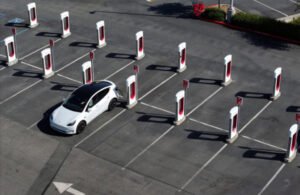
7 Reasons Tesla Stock Is Sinking
Tesla’s stock is experiencing a sharp decline. Despite Elon Musk’s optimistic outlook on sales, the situation remains grim. Investors are concerned. The company’s stock has been falling steadily. This decline is shaking confidence. What is causing this drop? Let’s explore the factors at play.7 Reasons Tesla Stock Is Sinking
Market Conditions
The broader market conditions have been unfavorable. Economic uncertainty is affecting many sectors. Tesla is not immune to these factors. Stock prices across the tech industry have been hit hard. Tesla’s situation reflects a wider trend.

Production Challenges
Production challenges have also played a role. Tesla has faced numerous issues in scaling up production. Supply chain disruptions have been frequent. These problems impact the company’s ability to meet delivery targets. Production delays are not new, but they continue to cause concern.
Competition in the EV Market
The electric vehicle market is a battleground for dominance. New entrants are emerging with innovative technologies. Traditional automakers are also expanding their EV offerings. This increased competition puts pressure on Tesla. The company’s market dominance is being challenged. Rivals are gaining ground and capturing market share.
Financial Performance
Tesla’s financial performance has been under scrutiny. Quarterly earnings reports have shown mixed results. Investors are concerned about the company’s profitability. The stock price reflects these financial uncertainties.
Investor Sentiment
Investor sentiment is a significant factor. Confidence in Tesla’s prospects is wavering. The stock’s recent performance has led to increased skepticism. Tesla’s stock price has been volatile, and this volatility affects investor sentiment.
Elon Musk’s Optimism
Elon Musk remains optimistic about Tesla’s future. He frequently highlights the company’s potential for growth. Musk’s confidence in sales and technological advancements is well known. However, this optimism has not been enough to stem the stock’s decline. Market realities are sometimes hard to overcome, even with strong leadership.
Market Reactions
The market reacts swiftly to news and performance indicators. Tesla’s stock has been impacted by a series of negative headlines. These include production issues, financial performance concerns, and competitive pressures. The market’s reaction has been sharp and unforgiving. Investor reactions can amplify stock movements, leading to further declines.
Strategic Adjustments
Tesla has been making strategic adjustments to address these challenges. New models and expansions into new markets are part of the plan. However, these strategies take time to show results.
Adapting to Market Demands
Tesla is actively making strategic adjustments to navigate its current challenges. These adjustments are essential for addressing market demands and staying competitive. The company is focusing on several key areas to regain momentum and investor confidence.
New Model Introductions
One of Tesla’s primary strategies involves introducing new models. The company aims to expand its product lineup with vehicles that cater to different market segments. New models are designed to attract a broader customer base and address varying preferences. By offering a diverse range of options, Tesla hopes to boost sales and capture more market share.
Technological Advancements
Investments in technological advancements are another critical component of Tesla’s strategy. The company continues to innovate in electric vehicle technology, including improvements in battery efficiency and autonomous driving features. These advancements are intended to enhance the appeal of Tesla vehicles and maintain a competitive edge in the EV market.
Expansion into New Markets
Expansion plans include increasing the number of international manufacturing facilities and sales networks. This global approach aims to mitigate risks associated with reliance on any single market.
Cost Management
Managing costs effectively is crucial for Tesla’s profitability. The company is implementing measures to control production expenses and improve operational efficiency. Streamlining supply chains and reducing manufacturing costs are part of this effort. These cost management strategies are designed to enhance profit margins and address financial pressures.
Strengthening Supply Chains
Addressing supply chain issues is another priority. Tesla is working on strengthening its supply chain resilience to avoid disruptions. This includes securing reliable sources for critical components and optimizing logistics. A more robust supply chain is expected to reduce production delays and support smoother operations.
Future Prospects
While these strategic adjustments are aimed at improving Tesla’s current situation, their full impact will take time to materialize. The company’s ability to execute these strategies effectively will be crucial for its recovery and long-term success. Tesla’s commitment to innovation and expansion reflects its determination to overcome present challenges and secure a stronger future.
Long-Term Outlook
The long-term outlook for Tesla remains a topic of debate. While the company faces short-term challenges, its long-term potential is still significant. Innovations in technology and expansion into new markets could drive future growth. However, overcoming current obstacles will be crucial for regaining investor confidence.
Evaluating Future Potential
Tesla’s long-term outlook remains a subject of significant interest and debate. While the company faces short-term hurdles, its future potential is substantial. Understanding this potential requires examining several key factors that could influence Tesla’s trajectory over the coming years.
Technological Innovation
Technological innovation is at the core of Tesla’s long-term strategy. The company continues to push boundaries with advancements in electric vehicle technology, including battery efficiency and autonomous driving capabilities.
Conclusion
Tesla’s stock plunge highlights several critical issues. Market conditions, production challenges, and increased competition are affecting the company. Despite Elon Musk’s sales optimism, these factors have driven the stock down. Investor sentiment is cautious, reflecting the broader uncertainties. The company is making strategic moves, but recovery may take time. For now, Tesla faces a challenging period, with its stock reflecting ongoing concerns.








